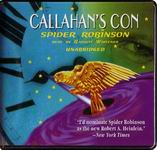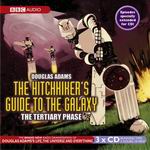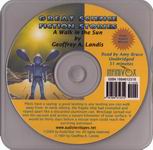
 The Hitch-Hiker’s Guide to the Galaxy
The Hitch-Hiker’s Guide to the Galaxy
By Douglas Adams, performed by a Full Cast
6 Cassettes, 6 hours [AUDIO DRAMA]
Publisher: The Mind’s Eye
Published: 1988
ISBN: 0881425671
Themes: / Science Fiction / Audio Drama / Humor / Aliens / Space travel / Time travel /
I have to cringe whenever an important milestone in Dr. Seuss’s surprisingly robust afterlife comes around, because it is inevitably greeted with a hundred grating “Seuss-like” paeans from every journalist, columnist and otherwise admittedly illiterate citizen who makes the amazing discovery that the English language is crammed to bursting with words that rhyme. More, even, if you make up a few of the words yourself. Douglas Adams can be similarly “inspirational”. Much of what is written about him is filled with disorientingly obscure citations and facile imitations. I appreciate why: He and Seuss made it look so easy, we can scarcely resist attempting to recreate their magic ourselves. But I will admit right now that if I could write like Adams, I wouldn’t be sitting here bashing out brief audio book reviews for an utter lack of pay. I will also admit that I have incorporated much of Adams’ prose into my own genome, and hope to transfer it genetically to my offspring (an aspiration my wife does not seem to regard with the same urgency). I will not, however, take a crack at trying to impress you with my abilities to mimic and quote. I don’t want to embarrass myself.
These tapes are of the very first incarnation of The Hitch-Hiker’s Guide to the Galaxy, the Ur-myth that inspired a trilogy of four novels, a diabolical computer game, a television show, and an upcoming movie. More than just a recording of a funny radio play, these tapes represent the annunciation of Douglas Adams as the major talent in science fiction humor: a veritable shot heard round the world. The story itself is an ambling monstrosity of interplanetary adventure, time travel, and hidden questions about the meaning of the universe and the origin and fate of the planet earth. Of course, with all successful humor, what it is really about are the characters (in this case, chiefly Arthur Dent, Ford Prefect, Zaphod Beeblebrox, Trillian, and Marvin the android) and the way they interact and bicker as wave after wave of crazy crap happens to them. The prose is exquisite (“They hung in the air exactly the way bricks don’t.” Oop! That was a quote, wasn’t it?), the settings range from imaginative (Magrathea) to bizarre (Milliways), and the information provided by the Guide itself is always tangential and hilarious.
But for fans of the books or the television show, what is truly remarkable about the first and second half of the tapes (the primary and secondary phases of the radio play) is not their utter perfection, but Adams’s uncanny ability to tweak them to even greater heights. The escape from Milliways is an excellent example. In these tapes, the use of an alien navy commander’s space ship is a little weak, but in the latter versions, the material Adams adds about the band “Disaster Area” and their cataclysmic concerts not only makes a better doomed escape, but contains some of the most memorable lines and images in the whole series. And the way he combines the primary and secondary phases of the radio show to produce an interweaving of the Dent/Prefect and Beeblebrox/Zarniwoop story lines in the novels not only increases the dramatic tension more organically, but also fills many of the logic holes that perforate the second half of these tapes. It’s like a graduate-level class in editing, only funny.
Of course, this radio play is not simply a virtuoso performance by the author, but a monumental ensemble production, as well. Mark Wing-Davey’s spacey portrayal of Zaphod Beeblebrox makes even Bill Murray’s Peter Venkman look pretty well plugged in, and Stephen Moore’s Marvin the android is a walking mechanical disaster of painfully amusing dimensions. Those are my two favorite performances, but the others are similarly tight: Simon Jones captures the bewilderment and hysteria of Arthur Dent perfectly; Geoffrey McGivern delivers a Ford Prefect who is helpful, roguish, and enigmatic; Peter Jones gives the voice of the book a zany, reassuring sound like a kindly but mad uncle; and Susan Sheridan provides a smart yet seductive Trillian Add in the myriad voices of mice, computers, doors, and smug waiters; the wonderful special effects of the BBC Radiophonic Workshop; and the loopy grandeur of the Eagles’ “Journey of the Sorcerer” as the main theme and you have a work of audio magic that will tickle your brain and delight your ears.
But don’t believe for a minute that we all walk around quoting this radio play in our daily speech simply because it provides hours of silly hijinx.. Adams ventures beyond situational and linguistic surprise to grapple with the humiliating vastness of the universe and the mind-boggling possibilities of infinity, and it is this theme that anchors the series so firmly in the subconscious. Philosophy, religion, and calculation are shown to be helpless before the unrelenting immensity of everything, and the only response we are left with is either suicidal hopelessness or laughter. We are forever indebted to Douglas Adams and the BBC cast for saving us with laughter. So I urge you to buy, rent, or steal these tapes as soon as you can and begin stuffing as much of the prose into your memory as it will hold. What else are you saving all that underpowered gray matter for?
Posted by Kurt Dietz

 Blackstone Audio has been building a fantastic science fiction and fantasy collection. Their narrators are generally good. Some of their latest include Spider Robinson’s Callahan books and Heinlein’s Citizen of the Galaxy. They also carry titles by Catherine Asaro, Charles Sheffield, Robert Silverberg, and Lois McMaster Bujold. They also produce MP3-CD versions of much of their catalog, which makes purchasing the titles outright very attractive.
Blackstone Audio has been building a fantastic science fiction and fantasy collection. Their narrators are generally good. Some of their latest include Spider Robinson’s Callahan books and Heinlein’s Citizen of the Galaxy. They also carry titles by Catherine Asaro, Charles Sheffield, Robert Silverberg, and Lois McMaster Bujold. They also produce MP3-CD versions of much of their catalog, which makes purchasing the titles outright very attractive. Recorded Books has the biggest collection of high quality science fiction and fantasy titles out there. Their narrators are just excellent, and include Frank Muller, George Guidall, Rob Inglis, and Richard Ferrone, among many others. To name a few titles: Kim Stanley Robinson’s Mars trilogy, Tolkien’s Lord of the Rings, several Robert A. Heinlein titles, Piers Anthony’s Incarnations of Immortality series, and Octavia Butler’s Parable of the Sower and Parable of the Talents. Doomsday Book and To Say Nothing of the Dog by Connie Willis are also here. Their rental plan now includes a Netflix-style option – for $30/month you can have as many titles as you can hear.
Recorded Books has the biggest collection of high quality science fiction and fantasy titles out there. Their narrators are just excellent, and include Frank Muller, George Guidall, Rob Inglis, and Richard Ferrone, among many others. To name a few titles: Kim Stanley Robinson’s Mars trilogy, Tolkien’s Lord of the Rings, several Robert A. Heinlein titles, Piers Anthony’s Incarnations of Immortality series, and Octavia Butler’s Parable of the Sower and Parable of the Talents. Doomsday Book and To Say Nothing of the Dog by Connie Willis are also here. Their rental plan now includes a Netflix-style option – for $30/month you can have as many titles as you can hear.




 A Wizard of Earthsea
A Wizard of Earthsea